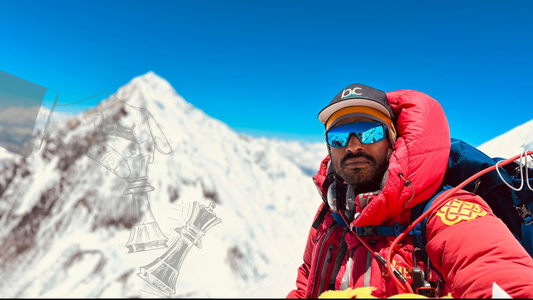The Chessboard to the Summit: How Chess Played a Role in Satyadeep Gupta's Historic Ascent
- Team ChessX

- Feb 18, 2025
- 4 min read

Satyadeep Gupta, an accomplished Indian mountaineer, his name in history by becoming the first person in the world to scale both Mt. Everest and Mt. Lhotse twice in a single season.
Additionally, he is the first Indian to traverse the two peaks in an astonishing 11 hours and 15 minutes.
While his physical endurance and technical expertise were key factors in this success, an often-overlooked aspect of his journey is his passion for chess.
Though not a professional player, Gupta plays chess regularly and has a deep love for the game. This passion for chess has significantly influenced his mountaineering endeavours.
In this post, inspired by Satyadeep's historic feat and recent discussions with him, we take a deep dive into how chess has helped him conquer unimaginable challenges.
The Conquest
The Strategic Mindset
Chess is a game that demands strategic thinking, foresight, and the ability to anticipate an opponent's moves. These skills are directly transferable to mountaineering, where every step and decision must be meticulously planned.
Gupta’s strategic mindset, honed through countless hours of chess, allowed him to navigate the complex and unpredictable challenges of high-altitude climbing. Just as in chess, where each move must be carefully considered to achieve victory, Gupta approached his climbs with a similar level of strategic planning and foresight.
Patience and Timing
One of the essential lessons chess teaches is the importance of patience and timing. In mountaineering, waiting for the right weather conditions or the perfect moment to make a push for the summit is crucial.
Gupta's patience, cultivated through his love for chess, enabled him to bide his time, ensuring he made his moves on the mountain at the most opportune moments. This patience was vital during his record-breaking ascent, allowing him to remain calm and focused despite the extreme conditions.
Problem-Solving Under Pressure
Both chess and mountaineering involve high-stress situations where quick, decisive thinking is critical. On the chessboard, a single mistake can lead to a loss, while on the mountain, it can mean life or death.
Gupta’s ability to solve problems under pressure, a skill sharpened through his regular chess play, was indispensable during his ascent. This mental agility helped him make swift and effective decisions, ensuring his safety and success.
Mental Endurance
The mental stamina required for a long chess match mirrors the endurance needed for prolonged climbs. Chess builds mental resilience, helping players stay focused and composed over extended periods.
This mental toughness was a significant asset for Gupta, aiding him in pushing through the physical and mental exhaustion of his grueling dual ascent.
His regular engagement with chess has fortified his mind, enabling him to endure the challenges of mountaineering with unwavering determination.
Future Ambitions: The Seven Summits

Satyadeep Gupta's next ambitious goal is to become the fastest person to conquer the Seven Summits, the highest mountains on each of the seven traditional continents. This ultimate challenge will demand even more from his strategic planning, patience, problem-solving skills, and mental endurance—qualities sharpened by his love for chess.
Advice for Children Learning Chess from Satyadeep Gupta: Mountaineering Analogies
Embrace Patience
Mountaineering: Just as climbers wait for the right weather to ascend safely, chess requires patience to make the right move.
Advice: Be patient and wait for the best moment to act, both in chess and in life.
Think Ahead
Mountaineering: Climbers plan their route and anticipate challenges.
Advice: Always think a few steps ahead in chess, anticipating your opponent’s moves.
Stay Calm Under Pressure
Mountaineering: In high-stress situations, staying calm is crucial for safety.
Advice: Develop the ability to stay composed and make clear decisions under pressure.
Learn from Every Game
Mountaineering: Each climb, whether successful or not, teaches valuable lessons.
Advice: Analyze each chess game to understand what you could improve, learning from both victories and defeats.











